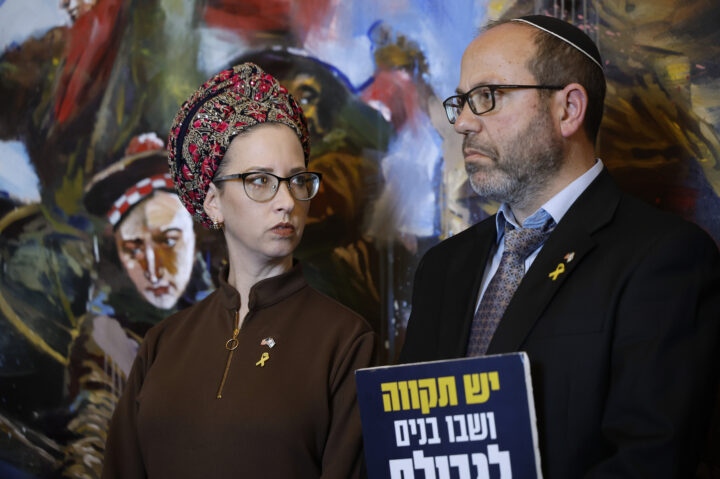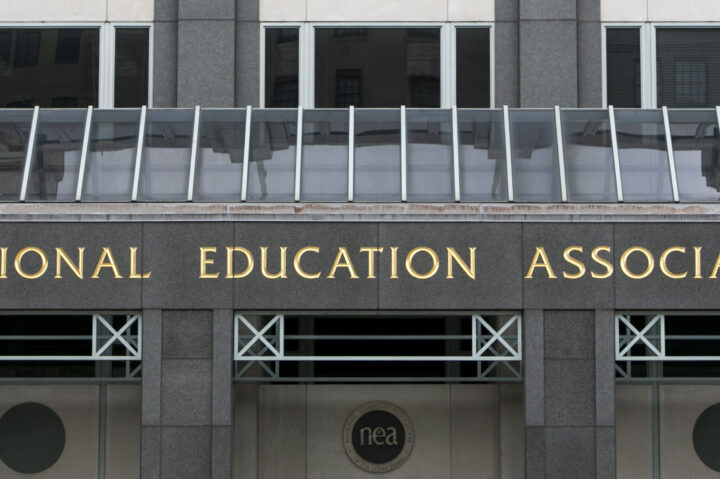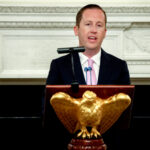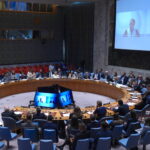Tzvika Mor, head of the hawkish Tikvah Forum, a minority group of hostages’ families, calls to prioritize defeating Hamas, says putting hostages first is ‘indescribable stupidity’

Chip Somodevilla/Getty Images
The parents of Eitan Mor, a security guard kidnapped on October 7 at the Supernova rave, wait to meet with Speaker of the House Mike Johnson (R-LA) and other fellow family members of kidnapped victims at the U.S. Capitol on February 06, 2024 in Washington,
The day after Israel’s Security Cabinet voted to seize control of Gaza City, the Hostages Families Forum organized a major protest in Tel Aviv against the decision, warning it would put their loved ones’ lives in danger.
But Tzvika Mor, father of hostage Eitan Mor, has been speaking out against the Cabinet decision for a different reason — he thinks the IDF should be pushing even more aggressively to take over the rest of Gaza.
Nearly two years since his son was kidnapped while working as a security guard at the Nova festival on Oct. 7, 2023, Mor, 48, has not wavered from his position that defeating Hamas must be Israel’s top priority in the war in Gaza, above the hostages.
Mor, who lives in Kiryat Arba, a settlement abutting Hebron in the West Bank, normally works as an ADHD coach. But since the Oct. 7 attacks, he has divided his time between advocating for the country’s victory over Hamas and serving as an IDF reservist in the Paratroopers’ Brigade. In the long term Mor wishes to see the entirety of Gaza become part of Israel, telling Jewish Insider in an interview on Sunday, “It is the land of the Tribe of Judah; it is ours.”
As chairman of the Tikvah Forum, a more hawkish minority group of hostage families than the larger and better-known Hostages Families Forum, Mor and several other hostages’ relatives oppose partial deals and the release of large numbers of terrorists, arguing that only sustained military pressure will bring all of the hostages home. Mor spoke out against the Israeli Security Cabinet’s recent decision in his interview with JI.
“The question isn’t what they’re going to do, but what is the goal. If the goal is to lead Hamas to negotiate, it will fail, just like in Gideon’s Chariots, which took five months and didn’t bring back the hostages and didn’t destroy Hamas,” Mor said, referring to the IDF operation that began earlier this year. “The goal cannot be to bring [Hamas] to talks; it must be to destroy them.”
Hamas, he said, is not motivated to return the hostages, because they have the food, fuel and water that they need to survive, but if they feared for their survival, the situation would be different.
Mor compared the situation to the story in Genesis in which Abraham’s nephew Lot is kidnapped by four kings, and Abraham took an army with him to fight the kings.
Abraham “didn’t talk to them. He didn’t pay them. He fought a war until they surrendered. That is the way,” Mor said.
Mor said fighting to pressure Hamas to return to the table reflects an order of priorities that is both wrong and ineffective.
“The war cannot be about the hostages, and I say that as the father of a hostage. How many soldiers should be killed for the hostages?” he asked. “You don’t go to war to bring back hostages. You go to war for sovereignty, for deterrence. Then, when you win, you get your captives back.”
Prioritizing the hostages “not only harms national security, but it also hurts the hostages, because Hamas learns that they’re the most important to us and raises the price all the time. It’s indescribable stupidity,” he lamented.
Mor warned that if Israel “concedes in Gaza, Hamas will never give up all of the hostages … And what would the message be to the Arabs in Judea and Samaria” – he asked, using the biblical name for the West Bank – “that kidnapping Israelis is the best thing to do?”
In the past, Mor said, “it was clear that there was no negotiating with terrorists. We would try to save our hostages and take risks, but we could not give in to terrorism.”
Mor cited research by the Yachin Research Center, which he said showed that four times more Israelis were killed in terrorist attacks between the signing of the Oslo Accords in 1993 and 2023 than in 1949-1992.
“That means that since Israel gave in to terrorism, more Israelis were murdered. It’s clear … That needs to stop,” he stated.
Asked about the concerns that other hostage families have expressed about expanded military action in Gaza putting their loved ones at risk, Mor responded with a question: “Is our war in Gaza necessary? If there weren’t hostages, would we still need to go to war?”
“The answer is yes, because [Hamas] cannot remain our neighbors after we saw what they can do, or they would do it again. They are religious people; they live for this. They don’t live for a nice house and a car and social status. Not for coffee shops and pilates. They live to kill Jews. They’re like zombies. You have to destroy them. The war would be necessary even if there were no hostages,” he said.
As such, Mor said, Israel must take the necessary steps to win the war in Gaza: “It cannot be that we will endanger 10 million Israelis because of the hostages. We need to solve that problem such that we are not harming national security.”
“We have fears, too,” he added, “but in war, some are hurt. Soldiers are injured in the war too.”
Mor and another one of his sons have been in combat units in the current war. Thirteen soldiers in Mor’s brigade have been killed.
Early in the war, after Israeli Prime Minister Benjamin Netanyahu met with members of the Tikvah Forum, Hebrew news coverage accused the forum members of being Likud plants or, at least, being easier for Netanyahu to talk to than the Hostages Families Forum, whose early leadership included political campaigners involved in protests seeking to bring down his government.
Mor, however, has been and continues to be critical of Netanyahu, who he said he hasn’t spoken to in six months, and of Likud ministers who he has spoken to more recently, including Intelligence Minister Gila Gamliel and Agriculture Minister and former Shin Bet director Avi Dichter.
“I tell them these things, but almost all of the ministers in Likud align with the prime minister and say we have to agree to partial [hostage] deals,” Mor lamented.
Mor says that he has faced pressure for raising a different voice from the more prominent hostage relatives, and that “people defame and curse me.” In December 2023, the father of another hostage accused him on live television of giving up on his son, leading Mor to start crying.
“The Israeli media doesn’t help. They lead the campaign” against him, he said. “But I feel that I am a messenger of the people of Israel. It is clear to me that the people of Israel want to win … They are connected to their roots, to the Land of Israel and to Judaism. They don’t want to be sold dreams and delusions that ‘it will all be OK, we can give in to terror and then deal with it later.’ We can’t deal with it. If we surrender, we will pay a higher price.”
Mor has not seen pictures or videos of his son Eitan, 25, since Oct. 7, 2023, but he said that the most recent sign of life he received was from Israeli intelligence services in February this year.
“We don’t know anything except that he’s alive,” Mor said.
In May, Eitan’s mother, Efrat Mor, said she learned from another hostage released in the first deal in November 2023 that Eitan is using his “incredible social skills … both for himself and for the other hostages” to lift everyone’s spirits.
Eitan is the eldest of eight children.
“He is very strong, physically and mentally. He was very Zionist. He was a fighter and commander in the Golani Brigade” of the IDF, his father said. “He’s not soft; he doesn’t whine. He is strong; he’s a leader. We are sure that if he is with other hostages, he is helping them and strengthening them.”
When Hamas terrorists attacked the Nova rave, Eitan contacted an uncle because his parents do not use phones on Shabbat. He said that he and his friends were hiding, and sent videos of terrorists on pickup trucks. He also sent his location so that his uncle could pass it on to the IDF. The last time he was in contact with his uncle was at 10:04 a.m. His parents did not know that he was at the party, and they did not find out about the Oct. 7 attacks or that their son had been taken hostage until the evening.
Later, Nova survivors said that Eitan left his hiding place and saved their lives, which his father said “tells you the most about him.”
“He could have gone home at 6:29, but he stayed to save people,” Mor said. “He hid people and ran with them until he was kidnapped at 12:30, not by Hamas but by Gazan civilians.”
In recent months, public sentiment in Israel has shifted noticeably. With most of Hamas’ senior military leadership eliminated, growing numbers of Israelis have begun to question the feasibility of Netanyahu’s goal of 'total victory' over Hamas

Amir Levy/Getty Images
Israeli soldiers organize military equipment while standing on armored personnel carriers near the border with the Gaza Strip on August 6, 2025 in Southern Israel, Israel.
Israeli Prime Minister Benjamin Netanyahu’s announcement on Thursday that Israel plans to take control of additional parts of the Gaza Strip before handing it over to an unspecified Arab governing authority is being met with hesitation from even some of Israel’s most stalwart defenders. The Security Cabinet voted early this morning to take control of Gaza City, stopping short of the full occupation previously discussed.
Throughout much of Israel’s war against Hamas in Gaza, the Israeli public broadly supported the military effort, even as progressive lawmakers such as Sens. Bernie Sanders (I-VT) and Elizabeth Warren (D-MA) painted the war as “Netanyahu’s war,” and the Israeli prime minister as the bogeyman-in-chief.
But in recent months, public sentiment in Israel has shifted noticeably. With most of Hamas’ senior military leadership eliminated, growing numbers of Israelis have begun to question the feasibility of Netanyahu’s goal of “total victory” over Hamas, given the terror group’s hold on the Gazan population and a lack of clarity on what’s left to accomplish militarily. Instead, polling shows that a large majority of Israelis prefer prioritizing a diplomatic resolution that secures the release of the remaining hostages, rather than expanding the military occupation of Gaza in hopes of complete surrender.
Netanyahu’s plan this week to occupy more of Gaza has begun to sap Israel’s political capital even among some of its closest allies on Capitol Hill, not to mention the isolation the Jewish state is facing from less-friendly European capitals. Even within the American Jewish community, as the war drags on into its 23rd month and with mounting IDF fatalities and no living hostages having been released since May, splits have emerged over the wisdom of Netanyahu’s double-down strategy.
Indeed, while the official Israeli position on its war against Hamas in Gaza has hardened, the approach in the Diaspora, both from Jewish groups and leaders and elected officials, has also shifted — in the opposite direction.
Meanwhile, the families of hostages, whose desperation has been deepened by recent videos and images of emaciated captives, have escalated their efforts, taking to the sea in a flotilla that sailed toward Gaza on Thursday in an effort to raise awareness about the plight of their loved ones.
Netanyahu, still mired in legal issues, finds himself in a bind of his own making amid mounting global pressure to end the war and let aid flow freely into Gaza — which contrasts sharply with right-wing members of his coalition who loudly call for the opposite, even as top IDF brass opposes a full Gaza takeover. Speaking from the Temple Mount/Al Aqsa Mosque in Jerusalem earlier this week, National Security Minister Itamar Ben-Gvir called on Israel to “conquer all of Gaza, declare sovereignty over the entire Strip, eliminate every Hamas member, and encourage voluntary emigration.”
On Capitol Hill, Israel’s traditional allies in the Democratic caucus — including some who have given Netanyahu leeway to press forward in Gaza in the past, even when it meant butting heads with the Biden administration — are beginning to shift.
Rep. Ritchie Torres (D-NY) told Jewish Insider’s Marc Rod that Israel is ultimately responsible for making its own decisions, but said he’d advise the Israeli government to seek an end to the war once the remaining 50 hostages are freed.
“The war fatigue and post-traumatic stress in Israeli civil society and in the Israeli military — as well as the humanitarian crisis in Gaza — have become unbearable,” Torres said. “Israel has degraded Hamas. And so once Israel has secured the release of the hostages, it should declare victory, end the war and focus on expanding the Abraham Accords to include relations with the likes of Saudi Arabia and Indonesia.” More reactions from Torres and other Democratic lawmakers here.
Rep. Dan Goldman (D-NY) said in a statement on Thursday that “Netanyahu’s personal and political interests are guiding Israel’s actions” and slammed the prime minister’s “ineffective military operation in Gaza,” which, he added, “has only led to more unnecessary deaths.”
Earlier this week, Rep. Valerie Foushee (D-NC) – who in 2022 was one of the first major recipients of support from AIPAC’s super PAC— announced she was signing onto legislation to ban offensive arms sales to Israel.
The New York Times’ Bret Stephens warned this week, “If Netanyahu makes the colossal mistake of trying to reoccupy Gaza for the long term, then no thoughtful person can be pro-Israel without also being against him.”
The new shift in tone — exacerbated by mounting concerns about humanitarian aid in Gaza and bolstered by Netanyahu’s recent efforts to prolong the war in Gaza — extends beyond Washington and the media elite to some of the leading Jewish communal organizations, figures and philanthropists, dozens of whom signed onto a letter to Netanyahu this week, condemning his government’s policies and rhetoric for causing “lasting damage” to Israel and Diaspora Jewry and calling for an end to the Israel-Hamas war. Read more in eJewishPhilanthropy here.
Mainstream groups and officials, such as the American Jewish Committee and U.K. Chief Rabbi Ephraim Mirvis, have in recent days expressed deep concern about the humanitarian crisis in Gaza and the prosecution of the war.
Israel finds itself, 22 months after Hamas’ attacks, at war at home and abroad. Hamas’ attack didn’t resolve the issues that had caused divisions in Israeli society in the months leading up to Oct. 7, 2023. The national cohesion following the horrific attacks has dissipated, and now segments of Israeli society are again at odds with each other, as Israel finds itself needing to win back invaluable political capital even as its leadership is taking it for granted.
The union’s board of directors said the proposal ‘would not further NEA’s commitment to academic freedom’

Kristoffer Tripplaar/Sipa via AP Images
A logo sign outside of the headquarters of the National Education Association (NEA) labor union in Washington, D.C. on July 11, 2015.
The National Education Association, the largest teachers’ union in the country, announced on Friday that it would not cut ties with the Anti-Defamation League, declining to implement a contentious resolution approved by its governing body earlier this month that sought to target the Jewish civil rights organization.
“After consideration, it was determined that this proposal would not further NEA’s commitment to academic freedom, our membership or our goals,” the union’s board of directors said in a statement.
The decision came nearly two weeks after the measure was adopted by the NEA’s representative assembly, its annual leadership gathering that drew more than 6,000 union delegates.
“There is no doubt that antisemitism is on the rise. Without equivocation, NEA stands strongly against antisemitism. We always have and we always will,” the NEA’s board wrote. “In this time of division, fighting antisemitism, anti-Arab racism, and other forms of discrimination will take more resources, not fewer. We are ready.”
ADL CEO Jonathan Greenblatt cheered the union’s decision to distance itself from the “misguided” measure.
“We are committed to working with the NEA and all teachers’ unions to join the Jewish community in making clear these hateful campaigns cannot succeed. They must redouble efforts to ensure that Jewish educators are not isolated and subjected to antisemitism in their unions and that students are not subjected to it in the classroom,” Greenblatt said in a statement.
The measure faced fierce backlash from the Jewish world. A letter authored by the ADL expressing opposition to the proposal — which would have discouraged educators from using teaching materials from the ADL — garnered the support of roughly 400 Jewish organizations across the country, including the leadership of the Reform, Conservative and Orthodox movements.
Other outside Jewish groups, including the Conference of Presidents of Major American Jewish Organizations, the American Jewish Committee and Jewish Federations of North America, released a statement welcoming the NEA’s rejection of the anti-ADL resolution.
The texts from Claire Shipman, published in a letter by the House Education Committee, call a Jewish board member a ‘mole’ and ‘extremely unhelpful’

Alex Wong/Getty Images
Acting Columbia University President Claire Shipman testifies before the House Committee on Education & the Workforce at Rayburn House Office Building on April 17, 2024 in Washington, DC.
Text messages obtained by the House Committee on Education and Workforce published in a letter on Tuesday revealed that Claire Shipman, acting president of Columbia University, suggested that a Jewish trustee should be removed over her pro-Israel advocacy and called for an “Arab on our board,” amid antisemitic unrest that roiled the university’s campus last year.
“We need to get somebody from the middle east [sic] or who is Arab on our board,” Shipman, then the co-chair of Columbia’s Board of Trustees, wrote in a message to the board’s vice chair on Jan. 17, 2024. “Quickly I think. Somehow.”
Shipman said in a follow-up message days later that Shoshana Shendelman, a Jewish board member who frequently condemned campus antisemitism, had been “extraordinarily unhelpful” and said, “I just don’t think she should be on the board.”
In another communication on April 22, 2024, according to the texts obtained by the committee, Wanda Greene, vice chair of the board of trustees, asked Shipman — referring to Shendelman — “do you believe that she is a mole? A fox in the henhouse?” Shipman agreed, stating, “I do.” Greene added, “I am tired of her.” Shipman agreed, “so, so tired.”
The messages were referenced in the letter, first obtained by Free Beacon, sent to Columbia on Tuesday by the committee’s chairman, Tim Walberg (R-MI), and Rep. Elise Stefanik (R-NY) as part of the committee’s ongoing investigation into whether the school is violating Title VI of the Civil Rights Act of 1964 by allowing harassment of Jewish students.
The lawmakers wrote in the letter, which was addressed to Shipman, “These exchanges raise the question of why you appeared to be in favor of removing one of the board’s most outspoken Jewish advocates at a time when Columbia students were facing a shocking level of fear and hostility.”
Columbia responded to the letter, in a statement to Free Beacon, claiming that the text messages were taken out of context.
“These communications were provided to the Committee in the fall of 2024 and reflect communications from more than a year ago,” the university said. “They are now being published out of context and reflect a particularly difficult moment in time for the University when leaders across Columbia were intensely focused on addressing significant challenges.”
Shipman, a former ABC News reporter, stepped into the role in March after interim President Katrina Armstrong’s abrupt resignation. At the time, Stefanik called the choice of Shipman “untenable.” On campus, the news of Shipman’s hiring was met with cautious optimism from pro-Israel student leaders.
Last April, Shipman testified at a congressional hearing regarding antisemitism at Columbia alongside then-Columbia President Minouche Shafik, who resigned from her post in August, and board co-chair David Greenwald. Shipman told members of the House Committee at the time that she knew Columbia had “significant and important work to do to address antisemitism and to ensure that our Jewish community is safe and welcome.”
In its reports on the Iranian ballistic missile strike on a home in Tamra, northern Israel, CNN described the city as Palestinian

JOHN WESSELS/AFP via Getty Images
The mother of one of the victims of an Iranian missile attack which destroyed a three-storey building in the northern Arab-Israeli city of Tamra, is comforted during a funeral in the northern Arab-Israeli city of Tamra, on June 17, 2025.
After an Iranian ballistic missile struck a home in the northern Israeli city of Tamra, killing a woman, her two daughters and her sister-in-law, news outlets faced an additional challenge beyond the sober responsibility of covering a tragic loss: choosing what language to use to describe these women and their ethnic identity.
Tamra is an Arab town, with a history dating back hundreds of years. When Israeli President Isaac Herzog visited on Wednesday, he talked about the “shared society of Jews and Arabs” in Israel that “believe in our common life together,” and described the victims as “Muslim women.” Most news reports — in major international outlets including the Associated Press, Reuters, The New York Times and The Wall Street Journal — referred to Tamra as either an “Arab-Israeli city” or an “Arab town in Israel.”
CNN, however, chose a different word for Tamra, a city that is firmly inside Israel’s original 1948 borders: Palestinian.
“Iranian strikes expose bomb shelter shortage for Palestinian towns inside Israel,” read one headline from this week. The accompanying article described Tamra’s residents as “Palestinian citizens of Israel.” Another story called Tamra a “Palestinian-Israeli town.”
The descriptor is sure to confuse some readers. If advocates for a two-state solution talk about separate Israeli and Palestinian states, how can there be a Palestinian town within Israel?
The use of the word is not a statement about the town being under Palestinian sovereignty or the jurisdiction of a Palestinian governing authority. The word is used to describe the national identity of the people who live there, similar to describing Americans of Chinese ancestry as Chinese Americans — only much more complicated, because of the recent politics of the war in Gaza and nearly eight decades of the ongoing Israeli-Palestinian conflict.
Anwar Mhajne, a political science professor at Stonehill College in Massachusetts, who grew up in the Arab city of Umm al-Fahm in Israel, told Jewish Insider that using the term “Palestinian” to describe her identity and the place where she grew up can serve as an educational opportunity for people from outside the region who don’t know the history of her community, which dates back several hundred years.
“If I’m talking to outsiders who don’t understand the history of the region, I would say, ‘It’s a historically Palestinian town inside of Israel,’” Mhajne said. “Then I have to tell them the whole story of how that happened. The reason why I do this is because I have people ask me, ‘Wait, you’re not Jewish, so how are you in Israel?’”
CNN’s use of the word “Palestinian” to describe the Arab-Israeli residents of Tamra reflects a broader linguistic shift that has been happening over the years among Israel’s Arab citizens, who account for about 20% of Israel’s population. A spokesperson for CNN did not respond to a question about whether the language reflected a change to the network’s style guide, but the recent language appears to be a shift for the news network, which even earlier this year used the term “Arab Israelis” in its reporting.
“There’s a growing trend going on in the past, I want to say 10, maybe 20, years, of people who are saying, ‘We are going to reclaim our identity as Palestinians, and we’re not going to be ashamed to call ourselves Palestinians,’” said Yasmeen Abu Fraiha, a fellow at the Harvard Kennedy School who is completing a fellowship at Harvard Medical School. She counts herself among that trend: She didn’t use the term “Palestinian citizen of Israel” to describe herself until her late 20s, after she studied at Hebrew University in Jerusalem.
Abu Fraiha grew up in a Jewish city in Israel and she trained at Israeli institutions. She was working at Soroka Hospital in Beersheba — the hospital that was hit by an Iranian missile on Thursday — during the Oct. 7, 2023, Hamas attacks, when she helped treat hundreds of people injured that day. She likes the term “Palestinian citizen of Israel” because it encompasses two parts of her identity that are both important, although she is not a stickler about the language; she previously served as health policy director at the Task Force for Health Promotion and Equity in the Arab Society at the Israeli Ministry of Health, an official government entity.
“First, yes, I’m Israeli. I was born and raised there. Hebrew is my first language. I love the Israeli culture,” Abu Fraiha explained. “I’m fully Israeli. And then at the same time, my history, my narrative, my national connection, is to the Palestinian people.”
Mhajne, too, identifies with the Israeli part of her identity. It’s the passport she holds. She is the product of an Israeli education, and earned her bachelor’s degree at Ben-Gurion University of the Negev. But that is not the full story of who she is.
“I do hold both close, dearly, and I think they’re very important to hold onto. Historically, culturally, in a lot of ways, we are Palestinian, and we share that story. It’s our ancestors’ stories. These towns and us, we’ve been there for a long time, even before Israel was a state.”
Among Israel’s Jewish population, the language has not caught on widely, although it has growing cachet among Israeli Jews on the political left. Israel’s government formally uses the term “Arab-Israeli” to describe this part of the population, and that is the language generally used in English, too.
Shayna Weiss, senior associate director of the Schusterman Center for Israel Studies at Brandeis, said the rhetorical matter can be “quite confusing” for her undergraduate students, so she usually discusses it at the beginning of each course she teaches about Israeli society.
“I generally use the term ‘Israeli Palestinian’ ‘Palestinian citizens of Israel,’ but there are also instances where some people have said they see themselves as Israeli Arab, like certain pop stars, that sort of thing. And if I know that’s what they think about themselves, that’s the term I try and use,” Weiss told JI.
The death of the women and girls in Tamra has brought to the surface a rhetorical debate that has been bubbling up for years. Ultimately, Mhajne argued, what matters is not the words used to describe them — but that they were human beings.
“It bugs me, honestly, sometimes when people fight over ‘Arab’ and ‘Palestinian,’” she said. “They’re someone’s wife and daughters.”
‘We think [we] will have some, or a lot of announcements, very, very shortly, which we hope will yield great progress by next year,’ the Middle East envoy said

CHIP SOMODEVILLA/GETTY IMAGES
White House special envoy Steve Witkoff briefly speaks to reporters as he walks back into the West Wing following a television interview on the North Lawn of the White House on March 19, 2025 in Washington, D.C.
Speaking at an event celebrating Israeli Independence Day on Monday, Middle East envoy Steve Witkoff suggested that he expects additional countries will join the Abraham Accords in the coming year.
“We think [we] will have some, or a lot of announcements, very, very shortly, which we hope will yield great progress by next year,” Witkoff said of the prospects for additional normalization between Israel and Arab states, at an event organized by the Israeli embassy in Washington.
Witkoff only gave a glancing mention of Iran, with which he is the lead U.S. negotiator, in his brief remarks, pledging that Tehran would never obtain a nuclear weapon, but not elaborating on the talks beyond that.
The U.S. envoy emphasized the need for Israeli unity, saying, “I urge the Israeli people to choose unity over division, vision over disagreement and hope over despair. When you do, Israel’s future will shine brighter than ever.”
Witkoff also said that one of the most joyous moments of his life was visiting with recently freed hostages from Gaza and singing Am Yisrael Chai with them and their families. He pledged to work “tirelessly this year” toward “peace, prosperity and for Israel, unity.”
The event for Yom Ha’Atzmaut also featured remarks from Secretary of Energy Doug Burgum.
‘It was made very clear to us it was not enough to just negotiate over their nuclear ambitions, that in their weakened state, you could not separate Iran's malignancy when it comes to all of their activity,’ she said

Anna Moneymaker/Getty Images
Rep. Debbie Wasserman Schultz (D-FL) speaks during a press conference on new legislation to support Holocaust education nationwide at the U.S. Capitol Building on January 27, 2023, in Washington, D.C.
Arab and Israeli leaders are insisting that any U.S. deal with Iran also include provisions to address Iran’s other malign activities in the region, including support for terrorist proxies, Rep. Debbie Wasserman Schultz (D-FL) told Jewish Insider following a trip earlier this month to meet with Israeli and Arab leaders in the Middle East.
Wasserman Schultz traveled with Sen. Joni Ernst (R-IA) to the Middle East for the third time since Oct. 7, 2023, visiting Israel, the United Arab Emirates, Bahrain and Jordan.
“There was a very clear urgency that the leaders we spoke to had to make sure that we … don’t let Iran up from their very weakened state. They’ve been badly pummeled and had significant defeats,” Wasserman Schultz told JI last week. “The consensus across the region, no matter where we went, was that we needed to make sure that continued and that we prevented them from achieving their nuclear weapons goals and that we particularly prevented them from continuing their support for terrorist activity.”
She said that notion was raised by multiple leaders without prompting from the U.S. lawmakers.
She said that “across the board” the leaders shared her view that any deal with Iran must “include defanging them — and that was a term that was used repeatedly, defanging them — and stopping them from continuing to terrorize” the region.
“It was made very clear to us it was not enough to just negotiate over their nuclear ambitions, that in their weakened state, you could not separate Iran’s malignancy when it comes to all of their activity — particularly if they got any relief from sanctions,” she said.
Middle East envoy Steve Witkoff, the lead negotiator for the U.S. in talks with Iran, suggested in a recent Fox News interview that the U.S. would consider allowing Iran to retain its enrichment capacity as part of a deal — a statement he later walked back — while Wasserman Schultz and Ernst were in the region. The outline Witkoff provided on Fox appeared to many to be equivalent to the original 2015 Joint Comprehensive Plan of Action which Trump withdrew from in his first term.
Wasserman Schultz called it “incredibly hypocritical” for officials from the new Trump administration, such as Witkoff, to endorse terms of a deal similar to the JCPOA. Wasserman Schultz ultimately voted for the JCPOA in 2015 and calls it “the most difficult vote I’ve cast in all the years I’ve been in Congress.”
She called on Witkoff and the American negotiators to seek a deal stronger than the original JCPOA, making her the latest pro-Israel Democrat to raise concerns about the potential terms of a new deal with Iran.
She said she’s “frustrated and concerned … and even angry” that the administration seems to be going “from pillar to post. Their discussions seem like they’re happening on quicksand and I have seen nothing that looks different than the agreement that [Trump] pulled out of.”
With Iran significantly weaker and more vulnerable than it was in 2015, Wasserman Schultz said the U.S. must seize the opportunity to push for a more comprehensive deal to prevent Iranian terrorist activity and stop Iran from obtaining a nuclear weapon.
If the U.S. does return to a deal similar to the JCPOA, Wasserman Schultz said that the ultimate result of Trump’s withdrawal from the original deal would have been allowing Iran to get “perilously close to a nuclear weapon” and removing the option to strengthen the original agreement through further negotiations.
Wasserman Schultz said that she told Israeli Prime Minister Benjamin Netanyahu, who aggressively opposed the 2015 deal, that she expected he would offer “the same howling pushback that occurred back during the Obama years when those negotiations were taking place” if Trump moves toward a deal similar to the JCPOA.
Wasserman Schultz and Ernst also discussed the ongoing war with Hamas in their meeting with Netanyahu. Compared to previous meetings, Wasserman Schultz said she believed that the prime minister and Israeli Minister of Strategic Affairs Ron Dermer outlined more comprehensive and specific strategies to achieve the release of the remaining hostages being held in Gaza.
“I probably have met with him five or six times over the course of the last year and a half there in Israel and in the U.S.,” Wasserman Schultz explained. “I was glad to see that they had varying approaches in terms of their negotiations and strategy with the ceasefire and hostage deals that they’re discussing. I was glad to see that and hear for the first time Dermer — and Netanyahu too — talk about the various options that they had, as opposed to it being a more minimalist conversation.”
Wasserman Schultz said she and Ernst had also spoken to Arab leaders about their proposals for post-war Gaza and achieving Saudi-Israeli normalization. She said the Arab leaders had been “very clear-eyed” about the difficulties of finding credible Palestinian leadership able to help move toward an eventual Palestinian state, but said they believed it was possible.
“I came away feeling like there could be some progress made. But it was clear that as a result of the war in Gaza, the signs of progress that we had hoped for when we were in Saudi Arabia on the night of Oct. 6 [2023] [were] further away at the moment than [they were] then,” Wasserman Schultz said.
But she added that the countries which have normalized relations with Israel are not retreating from those agreements and remain committed to them, highlighting as one example of the progress made that she was able to attend a Seder on the first night of Passover in Abu Dhabi.
Legislation would require the State Department to annually report anti-normalization efforts in Arab states.

Mark C. Olsen
U.S. Sen. Cory Booker addresses family, friends, elected officials, and New Jersey National Guard leadership during the farewell ceremony for more than 180 New Jersey Army National Guard Soldiers from Alpha and Charlie Companies, 2nd Battalion, 113th Infantry Regiment, at the Prudential Center, Newark, N.J., Feb. 4, 2019.
In a bipartisan effort to ease decades of tensions between Israel and Arab states, Sens. Cory Booker (D-NJ) and Rob Portman (R-OH) introduced legislation on Thursday that would require the State Department to provide an accounting of countries that punish individuals for engaging with Israel.
The bill, “Strengthening Reporting of Actions Taken Against the Normalization of Relations with Israel Act of 2020” would require the State Department to include a status report on anti-normalization laws in countries covered by the department’s Bureau of Near Eastern Affairs in its annual Report on Human Rights Practices. The requirement would run from 2021 to 2026.
(Read the full text of the bill, S.4482 – “Strengthening Reporting of Actions Taken Against the Normalization of Relations with Israel Act of 2020”.)
The legislation includes a provision stating that the Arab League “has maintained an official boycott of Israeli companies and Israeli-made goods since the founding of Israel in 1948.”
A number of Arab countries have laws punishing citizens for interacting with Israeli citizens and businesses. The Arab League first issued a formal boycott of Jewish businesses in 1945, three years prior to the formation of Israel. Afterwards, the League modified the ban to include secondary businesses affiliated or trading with Israel.
In a statement to Jewish Insider, Portman said, “I am proud to join Senator Booker on this bipartisan legislation which supports our ally Israel and the longstanding US policy that encourages Arab League states to normalize their relations with Israel.”
“Anti-normalization laws in the region continue to be a barrier toward communities, people, NGOs and business coming together. In my visits to the region, I’ve seen the deep and abiding friendships that exist, and they are essential to building a long term peace,” Portman continued. “This bill will discourage those Arab League states that continue to enforce anti-normalization laws and support efforts like those proposed by the Arab Council that encourage and defend community engagement amongst Arabs and Israelis.”
“Since my time in the Senate, I have consistently supported Arab-Israeli engagement,” Booker said in a statement. “The need for people-to-people engagement between these communities is not only a critical tool for diplomacy but also important for peace and economic prosperity in the region. Our bill will strengthen America’s commitment to pursuing peace by supporting and encouraging dialogue between Arab and Israeli citizens.”
The bill cites a number of organizations and groups working in support of normalizing relations.
The Arab Council for Regional Integration, one group praised in the bill, applauded Sens. Booker and Portman for sponsoring the legislation. “We are gratified that at a time of turmoil around the world, two prominent U.S. Senators have decided to stand with advocates of people-to-people engagement between Arabs and Israelis,” Arab Council co-founder Mostafa El-Dessouki told JI. “Civil society has always been the ‘missing piece’ in efforts to forge a just and lasting peace in our region. This bill will empower the many bridge-builders among us to move forward toward a ‘peace between peoples.’”
On Sunday, the leadership for the Conference of Presidents of Major American Jewish Organization released a statement praising Portman and Booker. “This bipartisan measure takes action against [anti-normalization] policies and promotes the process of further regional normalization with Israel, which is critical to achieving a genuine and lasting peace between the Jewish state and its Arab neighbors.”






























































